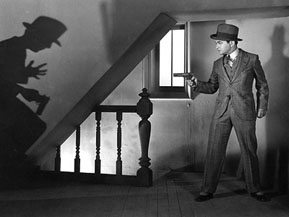Classic Movie Review: Little Caesar
By Josh Spiegel
November 27, 2009
What price arrogance? Can you think of a better question to ask at the holidays? Okay, there are plenty of other good questions to ask at this time of the year, but humor me today. Again, what price arrogance, specifically on the human spirit? Though it's considered a classic mobster movie, and rightly so, 1930's Little Caesar is, at least in some subtext, fascinated with the answer to this question. The lead character of the film, Caesar Enrico Bandello, begins in rags and ends in rags (reciting one of the more famous one-liners in cinema history in his dying breath), but hits some truly dizzying highs before his inevitable fall from murderous glory. Rico, as he'd like to be known (though the title of the film is the nickname he's given in the press), wants to be the best mobster there ever was, but this ambition gets him killed.
The film presented, for most of the country, a brand new movie star: the mobster. In some ways, Little Caesar is a classic in the same way that Citizen Kane is; you may not love the latter film (I do, but there are plenty of folks who aren't too hot on the movie, rightly claiming to have had the experience killed by a glut of hype), but its status as the best film ever is mostly due to the fact that, without it, there wouldn't be any kind of innovation in movies ever. Little Caesar is first and foremost classic because it's pretty much the first gangster talkie; at the very least, it was the first prominent film of its kind. The films that came afterward, such as Scarface or Angels with Dirty Faces, are an acknowledgment of this film's success.
The plot is simple enough: Rico starts out as a two-bit criminal, holding up small-town gas stations with the help of his best friend, Joe Massara, who'd rather be dancing (though there's a bit of homosexual subtext between these two, that's no euphemism). Rico is focused on being the kingpin to end all kingpins, though, and decides after the gas-station holdup that begins Little Caesar that he's going to the big, unnamed city. Once he's there, Rico weasels his way into being the bodyguard of Sam Vettori, the city's biggest and most powerful mobster. Eventually, Rico manipulates his way into being the top dog, which means that he can only end up as Vettori does, being humiliated and finding himself on the way down to pathetic infamy.
As Rico, Edward G. Robinson takes control of the movie from the very beginning. With his twisted face (making him look like a somewhat thinner, older, and slightly smaller version of John Belushi, actually), his slicked-back hair, and his beady eyes, Robinson was not anywhere close to the typical movie star. Even back in the 1930s, though, the studios knew that people couldn't, or wouldn't be entranced completely by the story of a man who was so superficially unattractive. Thus, we're given the stock love story as the subplot; Massara, portrayed by Douglas Fairbanks, Jr., almost immediately decides to pursue his dancing career at a nightclub that just so happens to be controlled by Vettori. Massara has found his lady love in Olga (Glenda Farrell), who wants him to go straight, even though Rico wants him to do the opposite.
Continued:
1
2




